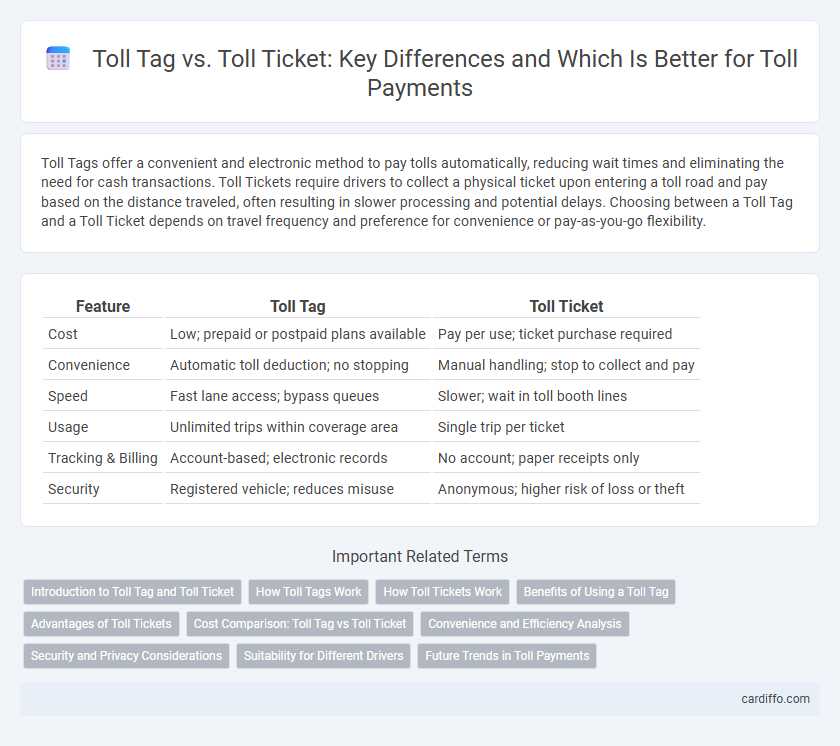Toll Tags offer a convenient and electronic method to pay tolls automatically, reducing wait times and eliminating the need for cash transactions. Toll Tickets require drivers to collect a physical ticket upon entering a toll road and pay based on the distance traveled, often resulting in slower processing and potential delays. Choosing between a Toll Tag and a Toll Ticket depends on travel frequency and preference for convenience or pay-as-you-go flexibility.
Table of Comparison
| Feature | Toll Tag | Toll Ticket |
|---|---|---|
| Cost | Low; prepaid or postpaid plans available | Pay per use; ticket purchase required |
| Convenience | Automatic toll deduction; no stopping | Manual handling; stop to collect and pay |
| Speed | Fast lane access; bypass queues | Slower; wait in toll booth lines |
| Usage | Unlimited trips within coverage area | Single trip per ticket |
| Tracking & Billing | Account-based; electronic records | No account; paper receipts only |
| Security | Registered vehicle; reduces misuse | Anonymous; higher risk of loss or theft |
Introduction to Toll Tag and Toll Ticket
A Toll Tag is an electronic device affixed to a vehicle that enables automatic toll payment without stopping at toll booths, using RFID or similar technology for quick lane passage. A Toll Ticket, on the other hand, is a paper or digital ticket issued at entry points on toll roads, recording the entry location and requiring payment upon exit based on distance traveled. Toll Tags offer convenience and faster processing, while Toll Tickets are typically used in systems without electronic toll collection infrastructure.
How Toll Tags Work
Toll tags use radio frequency identification (RFID) technology to enable automatic electronic payment at toll booths, allowing vehicles to pass without stopping. When a vehicle equipped with a toll tag passes under a toll plaza sensor, the system reads the tag's unique ID to deduct the toll fee from the driver's prepaid account instantly. This contactless process significantly reduces congestion and improves traffic flow compared to manual toll ticket collection methods.
How Toll Tickets Work
Toll tickets are physical or digital passes issued when entering a toll road without a toll tag, recording the entry point and time. The system calculates the toll fee based on the distance traveled between the entry and exit points, billing the driver accordingly. Payment usually occurs at designated toll booths or is mailed to the vehicle owner if the toll ticket is not surrendered at the exit.
Benefits of Using a Toll Tag
Using a toll tag offers seamless, automated payment, reducing wait times and allowing drivers to pass through toll plazas without stopping. It provides cost savings through discounted toll rates exclusive to electronic users, enhancing overall travel efficiency. Toll tags also minimize the risk of fines by ensuring accurate toll collection linked directly to the user's account.
Advantages of Toll Tickets
Toll tickets offer flexibility by allowing drivers to pay exact toll charges at the exit point rather than preloading funds, which is beneficial for infrequent or occasional highway users. They accommodate vehicles without electronic toll tags, eliminating the need for prior registration and making the system accessible for tourists or commercial vehicles passing through. Toll tickets also reduce the risk of overcharging and can be used across diverse toll plazas operating on ticket-based systems, enhancing convenience for long-distance travelers.
Cost Comparison: Toll Tag vs Toll Ticket
Toll tags often provide lower per-use costs and discounts for frequent travelers compared to toll tickets, which typically charge higher rates per passage. Toll tickets require payments based on distance traveled, often leading to increased expenses during peak times, while toll tags allow for fixed or reduced rates, enhancing overall cost efficiency. Choosing a toll tag minimizes fees and streamlines toll payments, offering significant savings over traditional toll tickets, especially for daily commuters.
Convenience and Efficiency Analysis
Toll Tags offer enhanced convenience by enabling automatic toll payment, eliminating the need to stop or slow down at toll booths, which significantly reduces travel time. Toll Tickets require manual collection and payment, often causing delays and increased congestion during peak hours. The efficiency of Toll Tags supports seamless electronic toll collection, improving traffic flow and reducing operational costs for toll operators.
Security and Privacy Considerations
Toll tags offer enhanced security through encrypted wireless communication, minimizing the risk of data interception compared to toll tickets, which rely on physical paper or barcode scanning vulnerable to tampering or duplication. Toll tag data is stored digitally, often linked to verified user accounts, providing controlled access and reducing risks of personal information exposure. In contrast, toll tickets may expose sensitive travel details if physically lost or mishandled, posing privacy concerns for drivers.
Suitability for Different Drivers
Toll tags offer the most convenience for frequent drivers, as they enable automatic payment and seamless movement through toll plazas. Toll tickets are more suitable for occasional drivers or tourists who prefer manual payment methods and do not require an account-based system. Each option caters to different usage patterns, with toll tags optimizing efficiency for daily commuters and toll tickets providing flexibility for infrequent travelers.
Future Trends in Toll Payments
Future trends in toll payments emphasize contactless and automated systems, with toll tags enabling seamless electronic toll collection through dedicated short-range communication (DSRC) or RFID technology. Toll tickets, traditionally paper-based, are increasingly integrated into digital platforms, allowing real-time tracking and automated billing using mobile apps and license plate recognition. Advancements in AI and IoT are driving the shift towards interoperable, cashless tolling ecosystems that enhance traffic flow and reduce congestion on smart highways.
Toll Tag vs Toll Ticket Infographic

 cardiffo.com
cardiffo.com